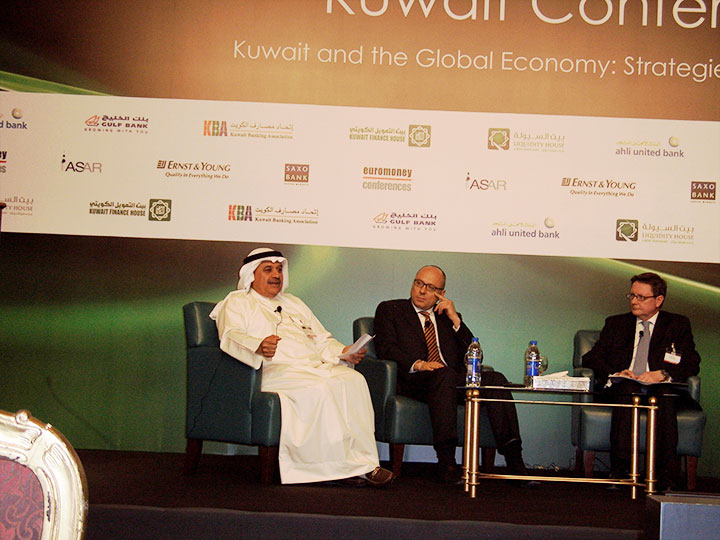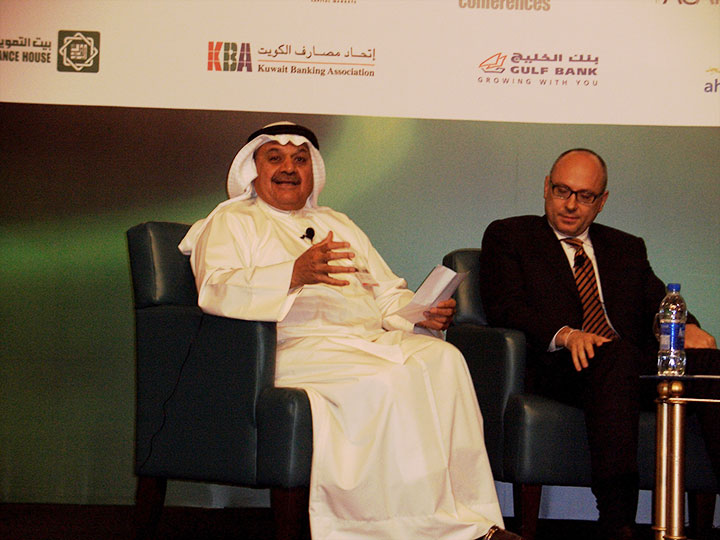Mr. Faisal Al-Mutawa’s participation into Euromoney Conference Kuwait
We are pleased to announce Mr. Faisal Al-Mutawa’s participation into “The Euromoney Kuwait Conference – Kuwait and the Global Economy: Strategies for Uncertain Times”, which was held on 27th March 2012 in Kuwait.
2012 Euromoney aimed at providing a global perspective and an independent platform to look at the future of the Kuwaiti and the global economy, since it has been an interesting year across the globe as countries deal with the repercussions of the global economic slowdown and debt crisis. The conference discussed how is Kuwait itself affected and what will change in the light of a changing global economic landscape.
Mr. Al-Mutawa participated into a panel discussion on “Investment Strategy in a Low/No Return Environment”. The panel featured a group of investment professionals from Kuwait and outside, they discussed the new investment landscape, the new strategies for asset allocation, whether investment has returned to the old paradigm of deal and manager selection, will growth be sectoral and specific or can one still find markets and asset classes to buy, and should investors of all types benchmark their performance-relative or absolute return.
Some of the key points Mr. Al-Mutawa raised and received a great audience interaction were:
- Political instability is number one enemy to the development of the local economy.
- Effect of the Arab Spring on its countries, the Arab world, and the rest of the world, with different degrees.
- The large stagnated government bureaucracy and its control over most sectors of the Kuwaiti economy.
- According to a release given lately by the Chairman of the Kuwaiti Industries Union, the government has not given any industrial land to investors since 1970’s, with few exceptions.
- Very old regulations that do not serve the vision of His Highness the Amir of turning Kuwait into a Trading and Financial Center.
- Economic freedom creates wealth, however Kuwait lacks this freedom when compared to other GCC countries; an example of this economic freedom is that countries that don’t enjoy natural resources are ranked the highest in income per capita and the richest in the world, i.e. Japan, Switzerland, Hong Kong, Singapore ….etc.
- Lack of credit is one of the major obstacles facing the investment sector in Kuwait.
- Lack of investment opportunities is putting a burden on the banking system as they don’t find proper channels for lending due to the continued drop in asset prices.
- According to World Bank, G20 spent US$ 12 Trillion in their domestic economies to reduce the impact of the financial crisis, while Kuwait enjoys surplus assets of approximately US$ 300 billion and a daily income around US$ 300 million on a daily basis, but spent almost nothing in its local economy to reduce the effect of the financial crisis in its economy.
- Many countries have reduced their interest rate to between 1% – 2%, however interest rate in Kuwait still at 2.5%

السيد فيصل المطوع في مؤتمر يورومني الكويت
شارك السيد/ فيصل علي المطوع – رئيس مجلس الإدارة والعضو المنتدب لشركة بيان للاستثمار – مؤتمر يورومني الذي استضافته دولة الكويت يوم الثلاثاء الموافق 27/3/2012 تحت عنوان “الكويت والاقتصاد العالمي: استراتيجيات لمرحلة عدم اليقين”.
عقد مؤتمر يورومني الكويت بهدف تزويد المختصين بنظرة شاملة وآلية مستقلة لبحث مستقبل الاقتصاد العالمي بشكل عام والكويتي بشكل خاص في ظل ردة فعل الدول تجاه تداعيات تباطؤ الاقتصاد العالمي وأزمة الديون. فقد ناقش المؤتمر كيفية تأثر دولة الكويت تحديدا وما هي التغيرات التي ستطرأ على البيئة الاقتصادية في ضوء التغير الذي تشهده ساحة الاقتصاد العالمي.
هذا وقد شارك السيد/ فيصل في الجلسة الثالثة من المؤتمر التي حملت عنوان “استراتيجية الاستثمار في بيئة منخفضة/منعدمة العوائد”، حيث ضمت الجلسة مجموعة من قادة الاستثمار من الكويت وخارجها لمناقشة المستجدات التي طرأت على الساحة الاقتصادية، الاستراتيجيات الجديدة لتوزيع الأصول، مدى ضرورة عودة الاستثمار لعهده السابق من حيث التداول واختيار المدير، إمكانية أن يصبح النمو قطاعي ومحدد ومدى القدرة على إيجاد أسواق وأنواع أصول أخرى للشراء، وهل يتوجب على جميع المستثمرين إضافة تعديلات على أدائهم النسبي أو العوائد المحققة.
كما استعرض السيد فيصل عدد من النقاط المحورية خلال الجلسة لاقت ترحيبا وتفاعلا من الحضور، كان أهمها:
- عدم الاستقرار السياسي يعتبر العدو الأول للنمو الاقتصادي.
- تأثير الربيع العربي على الدول ذات العلاقة، وعلى الوطن العربي بشكل عام، وامتداد تأثيره إلى باقي دول العالم.
البيروقراطية الحكومية المعقدة. - بناءً على تصريح صدر أخيرا من رئيس مجلس إدارة اتحاد الصناعات الكويتية، لم تقم الحكومة بتسليم أي قسيمة صناعية منذ السبعينات، إلا ما ندر.
- الأنظمة المتبعة في البلاد تعتبر بالية ولا تواكب نظرة حضرة صاحب السمو أمير البلاد حفظه الله بتحويل الكويت إلى مركز مالي وتجاري.
- إن الحرية الاقتصادية تخلق الثروة، إلا أن الكويت تفتقر هذه الحرية حتى بمقارنتها مع باقي دول الخليج العربي، ومثال على ذلك أن هناك دول لا تتوفر لديها الموارد الطبيعية مثل اليابان، سويسرا، هونج كونج، سنغافورة…الخ، إلا أنها تصنف من أغنى الدول في العالم وأعلاها من حيث دخل الفرد، لأنها تتمتع بالحرية الاقتصادية.
- شح التمويل المصرفي سببا رئيسيا في تعثر العديد من شركات الاستثمار.
- ندرة الفرص الاستثمارية أدت إلى ارتفاع نسبة السيولة لدى البنوك لتشكل عبئا على القطاع المصرفي دون إيجاد قنوات مناسبة للإقراض، خصوصا بعد الانخفاض المتواصل في أسعار الأصول.
- استنادا إلى تقرير صادر عن البنك الدولي، أنفقت مجموعة دول العشرين ما يقارب 12 ترليون دولار أمريكي لإنقاذ الاقتصاد المحلي والتخفيف من وطأة الأزمة الاقتصادية، بينما نجد الكويت التي تمتلك فوائض مالية وأصول خارجية فائضة تقدر بـ 300 مليار دولار وعوائد يومية بحوالي 300 مليون دولار أمريكي، الأقل إنفاقا على اقتصادها المحلي.
- قامت كثير من دول العالم بتخفيض معدل سعر الفائدة إلى ما بين 1% – 2%، بينما بقي سعر الفائدة في الكويت في حدود 2.5%.
- 0 Comment


